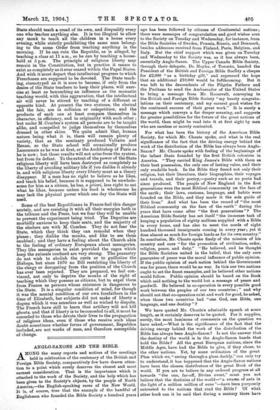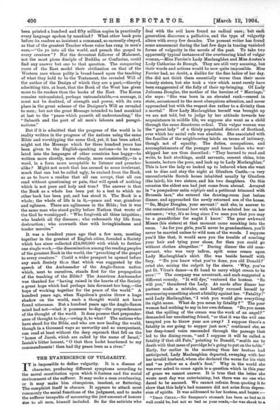A MONG the many reports and notices of the meetings held
in celebration of the centenary of the British and Foreign Bible Society, comparatively few have drawn atten- tion to a point which surely deserves the closest and most earnest consideration. That is the importance which is attached to the work of the Society, and the help which has been given to the Society's objects, by the people of North America,—the English-speaking races of the New World. It is, of course, true that the example of the handful of Englishmen who founded the Bible Society a hundred years
ago has been followed by citizens of Continental nations ; there were messages of congratulation and good wishes sent to the Society on Tuesday and Wednesday, for instance, from the Bible Societies of Sweden, Prussia, Russia, and Denmark, besides addresses received from Finland, Paris, Belgium, and Italy. But the chief support which was given on Tuesday and Wednesday to the Society was, as it has always been, essentially Anglo-Saxon. The Upper Canada Bible Society, through their delegate, Dr. Hoyles, of Toronto, handed the President of the British and Foreign Bible Society a cheque for £2,000 "as a birthday gift," and expressed the hope that an additional £10,000 would be fofthcoming. But it was left to the descendants of the Pilgrim Fathers and the Puritans to send the Ambassador of the United States to bring a message from Mr. Roosevelt, conveying to the British and Foreign Bible Society "my hearty congratu- lations on their centenary, and my earnest good wishes for the continued success of their great work." It is surely a message which conveys a far deeper meaning, and suggests far greater possibilities for the future of the great nations of the world, than might be read into it at first sight by men who are careless or merely contented.
For what has been the history of the American Bible Society, for which Mr. Choate spoke, and what is the real significance of the fact that the driving energy behind the work of the distribution of the Bible has always been Anglo- Saxon ? Mr. Choate spoke with feeling of the beginnings of the infant State founded by the first British colonists in America. "They carried King James's Bible with them as their best possession, the only one of lasting value, and their only readable book. In the Bible they found not only their religion, but their literature, their biographies, their voyages and travels, and their poetry,—poetry such as no poets had since produced. The people of New England in the first generations were the most Biblical community on the face of the earth ; their laws, customs, language, and habits were founded on the Bible, and they made it the sole guide of their lives." And what has been the record of "the most Biblical community on the face of the earth" during the years that have come after "the first generations " ? The American Bible Society has set itself "the immense task of keeping a population of eighty millions supplied with a Bible in every home, and has also to meet the needs of eight hundred thousand immigrants coming in every year; yet it does almost as much for foreign lands as for its own country." In conclusion, Mr. Choate spoke finely of the mission of his country and ours "for the promotion of civilisation, order, religion, peace, and duty." "He believed, and he thought the Bible Societies united in the belief, that the only sure guarantee of peace was the moral influence of public opinion. If the public opinion of each nation behind the Government was for peace, there would be no war. In this our two nations ought to set the finest examples, and he believed other nations would follow. Public opinion should be based on the Book which said nothing to the world but a message of peace and goodwill. He believed in co-operation in every possible good work between the peoples of our two countries ; " and why should not that co-operation exist and work for good, he asked, when those two countries had "one God, one Bible, one language, and one destiny " ?
We have quoted Mr. Choate's admirable speech at some length, as it certainly deserves to be quoted. For it supplies, surely, the most luminous of comments on the question we have asked,—What is the significance of the fact that the driving energy behind the work of the distribution of the Bible has always been Anglo-Saxon ? Is not the answer that the destiny of the world is in the Anglo-Saxon hands that hold the Bible ? All the great European nations, since the Middle Ages, have had the Bible to give, if they chose, to the other nations. Yet, by some ordination of the great Plan which we," seeing through a glass darkly," can only try to understand, it has happened that the Anglo-Saxon nations have been the chosen distributors of the great Book of the world. If you are to believe in any ordered progress at all towards "the one, far-off, Divine event," must you not believe that the destinies of the world—" a swarm of ants in the light of a million million of suns "—have been purposely entrusted to the nations that read the Bible ? Of what other book can it be said that during a century there have been printed a hundred and fifty million copies in practically every language spoken by mankind ? What other book puts before its readers so insistent a command, so earnestly obeyed, as that of the greatest Teacher whose voice has rung in men's ears,—" Go ye into all the world, and preach the gospel to every creature " ? Not the devoutest follower of Mahomet, not the most pious disciple of Buddha or Confucius, could find any answer but one to that question. The conquering races of the East model their civilisation on that of the Western race whose polity is broad-based upon the teaching of what they hold to be the Testament, the revealed Will of the author of the Design of which they are a part,—thereby admitting this, at least, that the Book of the West has given more to its readers than the books of the East. The Koran remains untranslated, perhaps untranslatable,—a message, it must not be doubted, of strength and power, with its own place in the great scheme of the Designer's Will as revealed to men; but not the great Message intended to lead mankind at last to the "peace which passeth all understanding," the " Sabaoth and the port of all men's labours and peregri- nations."
But if it is admitted that the progress of the world is in reality written in the progress of the nations using the same Bible and worshipping the same God, yet, it has been asked, might not the Message which for three hundred years has been given to the English-speaking nations—to be trans- lated into the languages of other countries less happy—be written more shortly, more clearly, more consistently,—in a word, in a form more acceptable to listener and preacher alike ? Might not much that has seemed to some irrelevant, much that can but be called ugly, be excised from the Book, so as to leave a residue that all can accept, that all can read without questioning or pain, that will speak of nothing which is not pure and holy and true ? The answer is that the Book as a whole has been put to a test to which no other book has been put, and has stood it. The Book is a whole ; the whole of life is in it,—peace and war, grandeur and ugliness. There are uglinesses in the Bible ; but it was the same man who stood guilty before Nathan that wrote of the God he worshipped "Who forgiveth all thine iniquities ; who healeth all thy diseases ; who redeemeth thy life from destruction ; who crowneth thee with lovingkindness and tender mercies."
It was a hundred years ago that a few men, meeting together in the greatest of English cities, founded a Society which has since collected £14,000,000 with which to further one single work,—the dissemination among the reading peoples of the greatest Book in the world, the "preaching of the gospel to every creature." Could a wider prospect be opened before any such Society than that which was suggested by the speech of the Ambassador of the Anglo-Saxon nation which, next to ourselves, stands first for the propagation of the teaching of the Bible ? The American Ambassador was thanked for "having raised in the hearts of the Society a great hope which had perhaps lain dormant too long,—the hope of working together for the peace of the world." A hundred years ago, when Napoleon's genius threw a huge shadow on the world, such a thought would not have found utterance. But a hundred years ago the Anglo-Saxon mind had not—what it possesses to-day—the preponderance of the thought of the world. It does possess that preponder- ance of thought to-day,—owing it, to what ? The nations who have stood for the Bible, and who are now leading the world, though in a thousand ways so unworthy and so unrepentant, can read at least without the deep reproach that fell on the " house of Jacob, which are called by the name of Israel," Isaiah's bitter lament, "0 that thou hadst hearkened to my commandments ! then had thy peace been as a river."











































 Previous page
Previous page